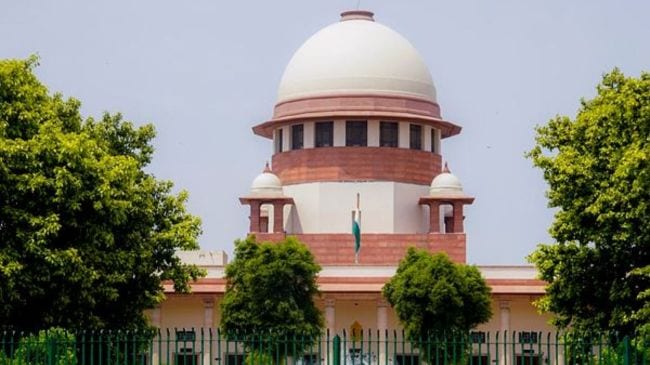Opinion Bail hearings must be expedited. Delays and careless advocacy threaten fairness of a trial
As per the latest statistics from the National Judicial Data Grid, roughly 2 lakh bail applications at the district court level and 1.63 lakh bail applications at the High Court level, along with approximately 7,000 criminal appeals at the Supreme Court level remain pending for disposal
 Supreme Court of India
Supreme Court of India By Kumar Ritwik
In recent weeks, the discourse around the significance of personal liberty and the quality of legal assistance rendered by advocates has gained momentum. The Allahabad High Court’s public admonition in Saba Siddiqui vs Shodul Hasan, recounting instances wherein disorganised and haphazard pleadings filed by advocates forced the Bench to invest an unduly long time to decipher the record, along with the clarion call issued by the Supreme Court in Anna Waman Bhalerao vs State of Maharashtra mandating that all bail applications be disposed of within two months of filing, must serve as moments of reckoning for the Bar.
These two instances underscore a deeper and structural concern: When matters concerning personal liberty are delayed through inefficiencies within the system or lapses in pleadings, the individual is forced to languish in uncertainty, deprived of their fundamental right to justice under Articles 14 and 21 of the Constitution of India. However, this delay is not confined to a few cases or one jurisdiction alone. Across India, almost every high court and most district courts are inundated with an overwhelming number of pending bail applications. As per the latest statistics from the National Judicial Data Grid, roughly 2 lakh bail applications at the district court level and 1.63 lakh bail applications at the High Court level, along with approximately 7,000 criminal appeals at the Supreme Court level remain pending for disposal.
For the accused persons — particularly in white-collar cases — this lethargy or uncertainty can lead to devastating consequences that extend beyond the individual’s detention. In these cases, individuals often face reputational ruin, business paralysis, freezing of assets, and cascading commercial consequences. As a result, the individual may be unable to perform critical business functions (authorising transactions, participating in meetings and/or overseeing compliance). Moreover, such cases frequently involve voluminous documentary evidence, technical complexities, and parallel regulatory investigations, which become extremely resource-intensive in nature. If the entire process is further delayed by adjournments and procedural errors, there is a serious risk of erosion of fairness.
In that context, an expeditious bail hearing almost becomes a necessity, not just an indulgence. To enable that, systemic reforms like administrative monitoring of listing and disposal in liberty matters would be required. Courts could ensure priority scheduling and/or consider designating a specific time slot during the working day for matters involving liberty, in order to speed up backlog disposal. Regularly publishing real-time statistics through mechanisms like the National Judicial Data Grid are steps in the right direction which have been able to enhance accountability as well. Further, court registries should be instructed to either flag such liberty matters that exceed two months or automatically list it on the next designated or available day. Lastly, encouraging judges and court staff to rely on digital records, AI-enabled tools, hyperlinked and bookmarked documents can drastically reduce the time spent in deciphering the record as well.
Systemic reforms cannot be implemented in isolation. They must be accompanied by robust, effective and responsible advocacy, which is central to recalibrating the system, ensuring that liberty matters are decided swiftly and elevating the quality of legal assistance as well. In that context, first, proactiveness on the part of lawyers to present precise and succinct pleadings, tightly curated legal authorities, and avoiding verbosity, would go a long way in ensuring that precious court hours are not wasted. Second, adjournments in liberty matters must only be sought when indispensable. Even when deemed absolutely necessary, these adjournments should not be sought or granted in an open-ended manner, but only with a fixed date or time period in place. Third, every well-intentioned lawyer should be encouraged to crystallise complex allegations into focused, fact-based submissions relying on summaries, tabulated indices, annotated charts, and identify core issues that the court should look at in liberty matters — absence of flight risk, strong community ties, no record/possibility of tampering with evidence, cooperation with investigators, health vulnerabilities, et cetera.
From the vantage point of a lawyer, the principle in Anna Waman Bhalerao vs State of Maharashtra that “prolonged delay in disposal of bail not only frustrates the object of CrPC but also amounts to a denial of justice under Articles 14 and 21” carries special significance. Faced with the monumental machinery of the state, which is armed with financial investigation units, forensic auditors, and an army of prosecutors, the lawyer’s fidelity to precision and clarity of thought becomes the final safeguard between liberty and state excess, especially in cases wherein the individual’s liberty, reputation, business and financial interests hang by a thread.
The rebuke by the Allahabad HC must serve as a wake-up call for the legal fraternity. Delay in justice is probably an injustice, but careless advocacy is certainly a betrayal. Combining legal precision with urgency is necessary to ensure that the promise under Article 21 of the Constitution is a lived reality in every courtroom.
The author is an Advocate based out of Delhi. Views are personal




